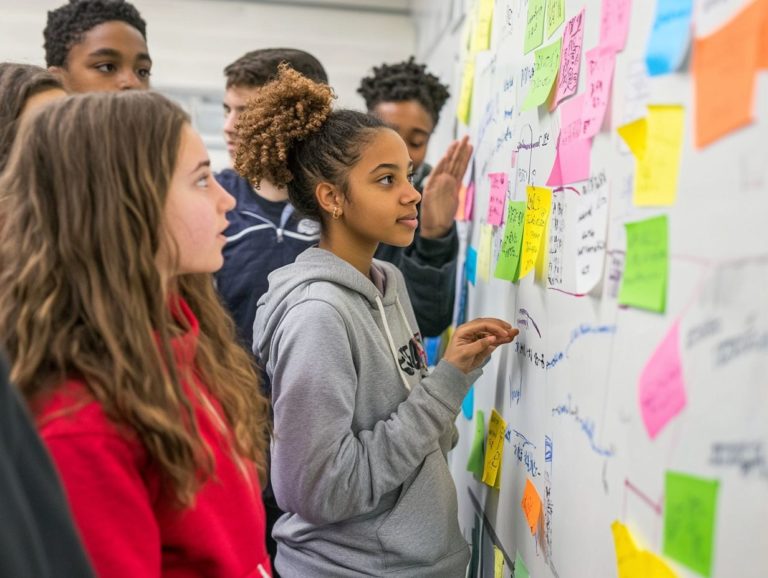Adjusting Your Study Habits to Fit Local Norms
Navigating a new academic environment can present a unique blend of excitement and challenges. Understanding the local study culture is crucial for your success. Various factors shape how students engage with their studies.
Let s explore how to adapt to your new study environment! This article highlights key differences in study habits and offers practical strategies for adjustment. It will also tackle common challenges that arise during this transition, equipping you with tips to maintain effective study routines.
Embrace this journey and optimize your learning experience to its fullest potential!
Contents
- Key Takeaways:
- Understanding Local Study Culture
- Adapting to Local Norms
- Overcoming Challenges in Adjusting Study Habits
- Maintaining Good Study Habits
- Frequently Asked Questions
- What does it mean to adjust your study habits to fit local norms?
- Why is it important to adjust my study habits to fit local norms?
- What are some common local norms that may affect my study habits?
- How can I identify and adapt to local norms for studying?
- What if adjusting my study habits to fit local norms conflicts with my personal preferences?
- How long does it take to adjust study habits to fit local norms?
Key Takeaways:

- Embrace the local study culture by understanding the factors that influence study habits.
- Be aware of differences in study habits and use strategies to adjust to local norms for better academic success.
- Overcome challenges in adjusting study habits by identifying common difficulties and utilizing effective solutions.
Understanding Local Study Culture
Understanding the nuances of local study culture is crucial for you as a student. Adapting your study habits can help you achieve academic success.
Different regions prioritize various study techniques. This may include the value placed on group study sessions or the preferred resources available to you.
Cultural factors significantly shape your learning style, influence your self-care practices, and affect how you minimize distractions in your study environment.
By grasping these local dynamics, you can develop effective study practices that align with the norms around you. This ultimately enhances both your academic performance and personal growth.
Factors that Influence Study Habits
Several factors influence your study habits, each playing an important role in shaping your academic success and effectiveness in learning.
Among these factors are your unique learning styles, which dictate how you best absorb information. The study environment is equally important, as it can either enhance or impede your focus and productivity.
External distractions, whether from your surroundings or technological devices, can significantly impact your ability to engage with study materials effectively.
Psychological factors are crucial in this balance. Your motivation and mindset influence your commitment to studies and how you perceive challenges. Social influences, like peer support and family expectations, shape your attitudes toward learning.
Recognizing and adapting to your unique learning style is paramount. It paves the way for better retention of information and fosters confidence in your academic pursuits.
Addressing these diverse influences enables you to cultivate effective study habits that lead to long-term success.
Adapting to Local Norms
Adapting to local norms around study habits is essential for you as a student. This means immersing yourself in the tips for effective study habits abroad that reflect the preferred techniques of your community.
These techniques may lean towards solitary sessions or collaborative group efforts. By embracing these local practices, you can enhance your study environment.
Your study environment often mirrors the cultural attitudes toward learning and education. Integrate motivational techniques that align with local traditions to create a more supportive and inspiring learning atmosphere.
Don t wait! Start adapting your study habits today to unlock your full potential!
Identifying Differences in Study Habits

Identifying differences in study habits across various cultures and communities can offer valuable insights into diverse learning styles that contribute to academic success. Students approach their study techniques differently, shaped by upbringing, peer accountability, and societal emphasis on education.
Some students thrive in collaborative settings, where ideas are exchanged and motivation flows from peers. Others may concentrate better and achieve deeper comprehension in solitary study environments. These preferences can significantly impact performance and understanding of complex topics.
Recognizing these behaviors is essential. Assess your learning style whether you naturally gravitate towards collaboration or prefer independent study and adapt your strategies accordingly.
Why not try forming study groups to boost your learning if you are a social learner? Alternatively, set aside quiet time for introspective study sessions. These adjustments can enhance your academic performance and satisfaction.
Strategies for Adjusting Habits
Effective strategies for adjusting your study habits can impact your learning effectiveness and academic performance. Techniques like the Pomodoro Technique create focused study sessions while minimizing distractions.
Integrating self-care practices, such as regular exercise and a healthy diet, enhances cognitive function and promotes efficient time management. This leads to better study outcomes.
Establish a dedicated study space free from interruptions. A well-organized environment fosters concentration and reduces anxiety. Using focus apps can help track productivity and limit access to distracting websites.
Experiment with spaced repetition, a study method that helps you remember information by reviewing it at spaced intervals. This can optimize long-term memory retention.
Implementing these strategies can improve your comprehension and make study sessions more enjoyable and effective, paving the way for greater academic success.
Overcoming Challenges in Adjusting Study Habits
Overcoming challenges in adjusting your study habits is crucial for enhancing effective studying and achieving academic success. Don t let distractions from technology, noisy environments, or a dip in motivation hold you back!
Facing these challenges requires a positive attitude. Consider establishing a dedicated, quiet space for study sessions and using motivation techniques to stay engaged.
Common Difficulties and Solutions
Common challenges in adjusting your study habits often arise from distractions, whether from your surroundings or internal thoughts. These distractions can hinder effective studying and impact cognitive function.
In today s fast-paced world, procrastination complicates your efforts, leading to that frantic last-minute scramble for information. Combat this by using the Pomodoro Technique study in short, focused bursts followed by brief breaks. This approach helps maintain concentration and prevents burnout.
When it comes to time management, the inability to prioritize tasks can be a significant hurdle. Tools like calendars and to-do lists can enhance your organization, ensuring that you meet crucial deadlines.
External distractions can also be minimized by creating a dedicated study space and using apps to block non-essential sites during study hours. This cultivates a conducive learning environment and maximizes your potential.
Maintaining Good Study Habits

Maintaining strong study habits is vital for achieving academic success. It demands ongoing effort and dedication. Establishing a consistent study routine with specific times for your study sessions fosters discipline and enhances effectiveness.
Prioritizing self-care getting enough sleep, exercising regularly, and maintaining a healthy diet is crucial for sustaining how your brain works. This approach enables you to stay focused and committed to your study goals.
Tips for Consistency and Success
To ensure consistency and success in maintaining effective study habits, implement several practical tips that enhance your studying and time management skills. Start by creating a personalized study plan that details specific materials and techniques tailored to your unique learning style. This provides clarity and direction.
Employing motivation techniques like positive reinforcement and peer accountability helps you stay committed to your study schedule. This will enable you to reach your academic goals.
Incorporating regular breaks into your study sessions boosts concentration and retention. Time management is vital; allocate your time wisely for each subject to avoid last-minute cramming.
Use tools like calendars or productivity apps to track your schedule. These will help you stay organized and focused.
Creating a supportive study environment free from distractions further enables your consistent efforts. Set realistic objectives and progressively tackle challenging topics to build confidence in your abilities. This makes the journey toward academic success manageable and enjoyable.
Frequently Asked Questions
What does it mean to adjust your study habits to fit local norms?
Adjusting your study habits to fit local norms means adapting your usual study routine to match the expectations and practices of the culture or community you are in. To learn more about this, check out how to adapt your study techniques abroad. This can include changes in study methods and time management.
Why is it important to adjust my study habits to fit local norms?

Adapting your study habits to fit local norms can supercharge your efficiency and boost your performance. It also helps you understand and integrate into the local culture, which benefits your academic and personal growth.
What are some common local norms that may affect my study habits?
Local norms vary greatly, but common examples include study times, group study practices, and preferred methods. For instance, some cultures value studying late into the night, while others prioritize early morning sessions.
How can I identify and adapt to local norms for studying?
Talk to local students to learn about study norms. They can offer insights into effective study practices in your community.
What if adjusting my study habits to fit local norms conflicts with my personal preferences?
Finding a balance between adapting to local norms and staying true to your preferences is essential. Incorporate aspects of both to create a study routine that works for you. Communicate with your peers and professors about your needs to find a compromise.
How long does it take to adjust study habits to fit local norms?
The time it takes to adjust can vary based on the individual and the extent of changes. It may take a few weeks to get used to new methods, while fully integrating into the local culture may take longer. Be patient and seek support if needed.






